 Steffen Popp (Bild: Johannes Puch)
Steffen Popp (Bild: Johannes Puch)
Steffen Popp (G) Jury discussion
Steffen Popp was the last author of the second day and read the "Spur einer Dorfgeschichte". He was nominated by Meike Feßmann.
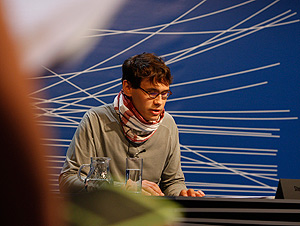 Steffen Popp (Bild: Johannes Puch)
Steffen Popp (Bild: Johannes Puch)
A attempt at an inventory of a village
The text is an attempt to carry out a literary inventory of a village, "something to see, to penetrate, who knows what" as it says in the text. The interpretations from the jury caused by the text were correspondingly varied.
Winkels: "Text half finished"
Hubert Winkels saw the text as half finished, even if it was in fact "the final version". The reader is forced with this style of writing to connect the "stitched together" images or pearls himself. He felt there was no"trigonometric point " from where the story can make its starting point. The text is a step above all others and leaves the finish to the reader, and everything is still being created - a story as "recapitulatory remembering".
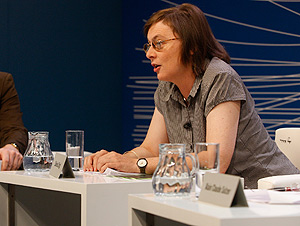 Daniela Striegl (Bild: Johannes Puch)
Daniela Striegl (Bild: Johannes Puch)
Winkels: "Steffen Popp is a poet"
Alain Claude Sulzer added his criticism: the "litany-like tone" of the presentation had confirmed his fears. He would have been interested in how the text sounded to the author, the presentation itself had not revealed much more than by reading. He had read it sentence by sentence, but had no real opinion on this text, which was actually more poetry than prose. The link to poetry suggested by Sulzer was then confirmed by Winkels: Steffen Popp is indeed a poet.
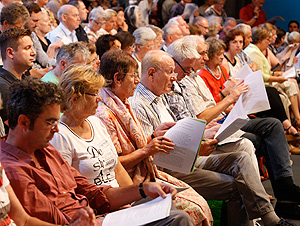 Publikum (Bild: Johannes Puch)
Publikum (Bild: Johannes Puch)
Feßmann explains the text
Meike Feßmann felt it necessary after seeing her colleagues' comments to explain what the text was about. The sense of order created here is"incredibly dense": "every sentence, every thought has its place" - but that needs intensive reading. The text is the reconstruction of the history of a village in Thüringen, driven through in an old Golf by the trio Cordelia, Berthold and Dirk.
The history of the village is told with "incredibly poetic images" (the village as a vampire that sits on a ridge). The "missing" basic idea criticized by Winkels ought to be obvious: glass was manufactured in the village, and this was also the poetic basic idea: using airy, light and transparent language, the story tells what the mind of the "thinking scribe" has collected along the way.
These " sophisticated" narratives actually make the "static" texts "dynamic". The narrator talks to himself as "you", which is also reminiscent of poetry.
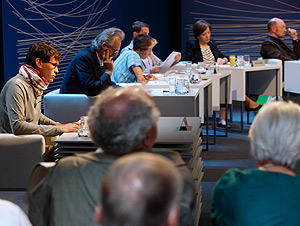 Steffen Popp (Bild: Johannes Puch)
Steffen Popp (Bild: Johannes Puch)
Spinnen reminded of a jazz musican
Burkhard Spinnen felt that Popp's text reminded him of a jazz musician, who with "admirable confidence" varied his tune, yet always found the way back to the harmony of the whole. But for him remains the prosaic question: so what, Thüringen? "A balancing act", said Spinnen, that he was pleased to watch. Nvertheless, one should beware of being locked into the "excessively virtuous performance one is reduced as a reader to an analyst of the construction of the text.
Jandl: "New motifs constantly discovered"
Keller criticized that Popps does not "organise" his material - Paul Jandl however saw this as "legitimate" that the reader "should also sometimes do something". He read the text a number of times and continually discovered new motives and poetic images. Just like a "woven tapestry", it gave him great pleasure.
Strigl: "Readers can also make the effort"
Daniela Strigl criticized that the differentiation of the characters had not succeeded (she speaks of four protagonists), she found it good that through the text "something was expected" of the reader, and space was found for "another tone". She was pleased that the story here was told using the tools of poetry, leading far away from the clichés of the village. "I will exert myself, and the reader can also make the effort".
Barbara Johanna Frank
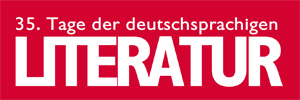 TDDL 2011
TDDL 2011